Overview of Presentation
- Functional assessment of the patient.
- Relevant additional observations.
- Nursing diagnosis based on the available information.
- List of interventions and resources.
Background of Movie and Character
- The Mask is a romantic comedy film.
- The protagonist is Stanley Ipkiss, a bank employee.
- The film revolves around the mysterious artifact.
- The mask exaggerates Stanley’s features of character.
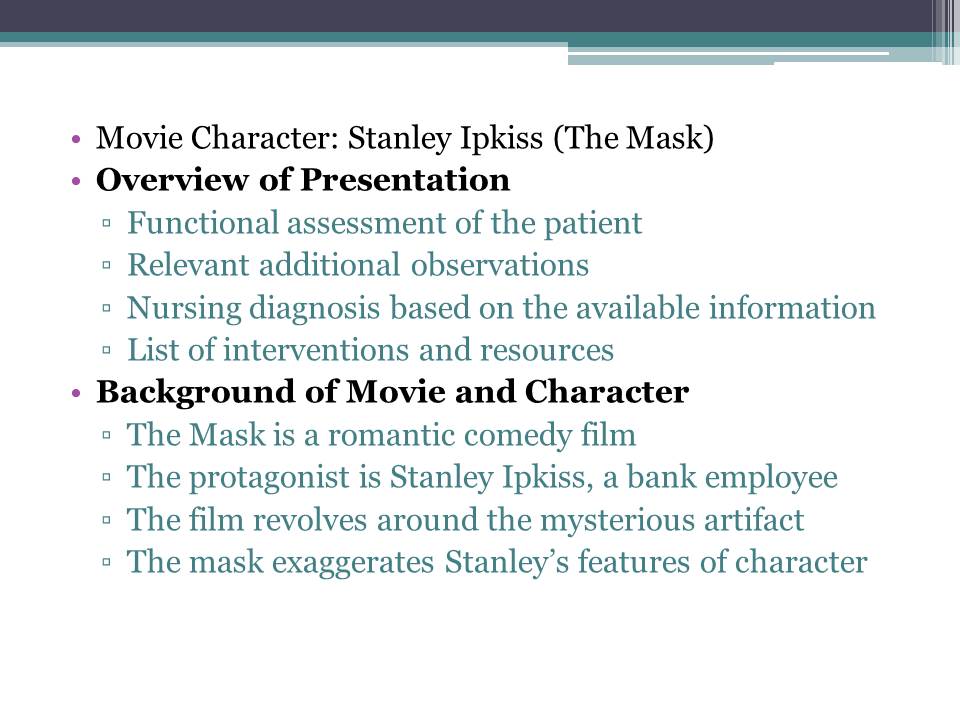
Functional Assessments
Health Perception/Health Management
- Maintains healthy behavior (no smoking, no alcohol).
- Occasional colds (no more than twice a year).
- No workplace accidents (generally safe workplace environment).
- General appearance suggests no apparent adverse conditions.
Nutrition/Metabolic
- Regular food and fluid intake (mostly healthy food).
- Excellent appetite, no discomfort during food intake.
- Teeth: satisfactory general appearance. Two dentures.
- Weight: 156 pounds. Height: 6 ft. 2 in.
Pattern of Elimination
- Bowel elimination pattern: regular, no discomfort, no control problems.
- Urinary elimination pattern: regular, no problems in control.
- No reported perspiration problems or excessive odor.
- Excreta examination: no consistency or color deviations.
Pattern of Activity/Exercise
- Exercise pattern: irregular visits to the gym.
- No reported energy inconsistency for routine activities.
- General appearance: excellent hygiene and energy level.
- Examination: muscle firmness and respirations within the acceptable limits.
Conceptual/Perceptual Pattern
- No hearing or vision problems, no glasses.
- No reports of inability to remember things.
- No reported difficulties in making important decisions.
- Examination: no apparent visual or auditory disorders.
Pattern of Sleep and Rest
- Regular and well-maintained sleep pattern.
- No medications required for aiding the onset of sleep.
- No early awakening. No nightmares or sleep disorders.
- Rest-relaxation periods within the designated limit.
Pattern of Self Perception and Self Concept
- Self-described as physically and mentally healthy individual.
- No apparent external sources of anxiety or anger.
- Maintains a positive attitude despite constant mishaps.
- Examination: maintains eye contact, does not display nervousness.
Role/Relationship Patterns
- Lives alone, does not maintain ties with family.
- Constantly tries (unsuccessfully) to engage in the relationships.
- Does not belong to social groups, has no real friends.
- Has a sufficient income to support needs of solitary life.
Sexuality/Reproductive Patterns
- No regular sexual relationship in the last decade.
- No observed changes in sexual activities since college.
- No reported problems associated with use of contraceptives.
Pattern of Coping and Stress Tolerance
- No significant changes in life for the last decade.
- No reported emotional breakdowns, no use of medications.
- Relaxed most of the time occasional thoughts of crisis.
- Difficulties mostly handled through upbeat attitude.
Pattern of Values and Beliefs
- Generally dissatisfied with progress and achievements in life.
- No reliance on religious practices in approaching difficulties.
- No conflicts with beliefs on receiving care.
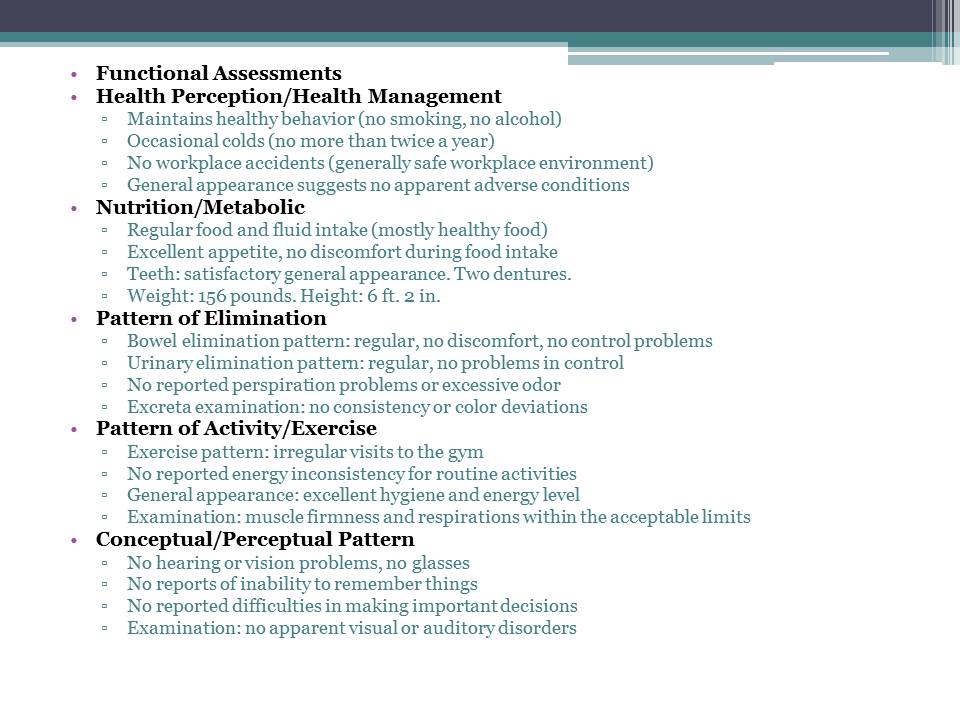
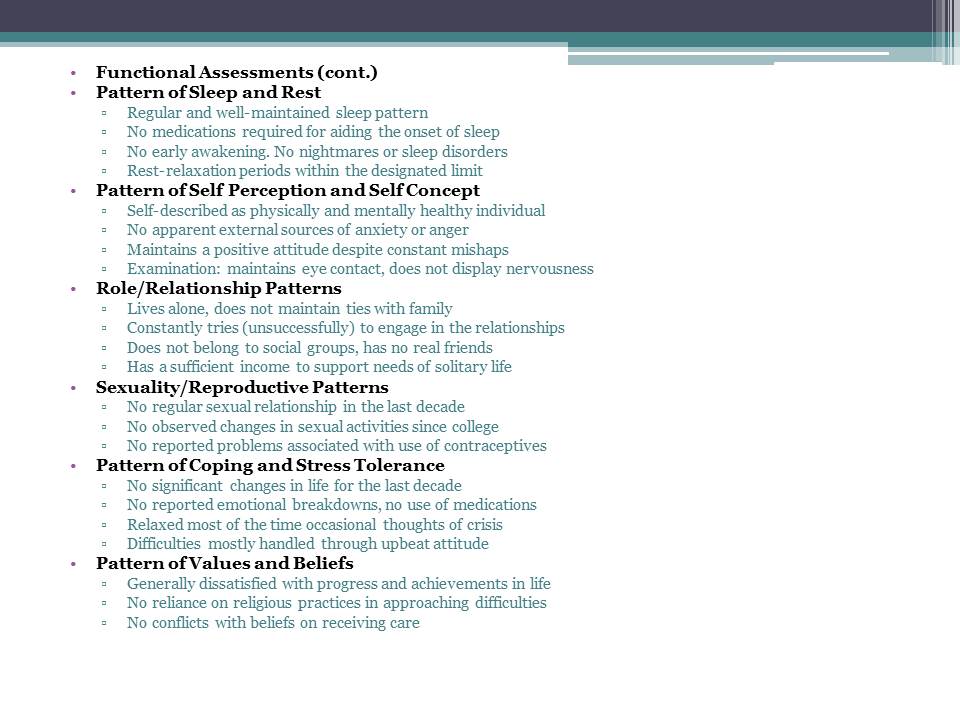
Analysis of Health Assessment
Normal assessment findings
- Excellent physical shape despite absence of physical exercise.
- Robust nutritional habits and normal bodily functions.
- No substance abuse or need for additional medications.
- Above normal energy level; healthy sleep patterns.
Abnormal or risk-based findings
- Lack of family ties and social interactions.
- Absence of close friends and regular sexual partner.
- General disillusionment in life, no satisfaction with progress.
- No identified ties with family members.
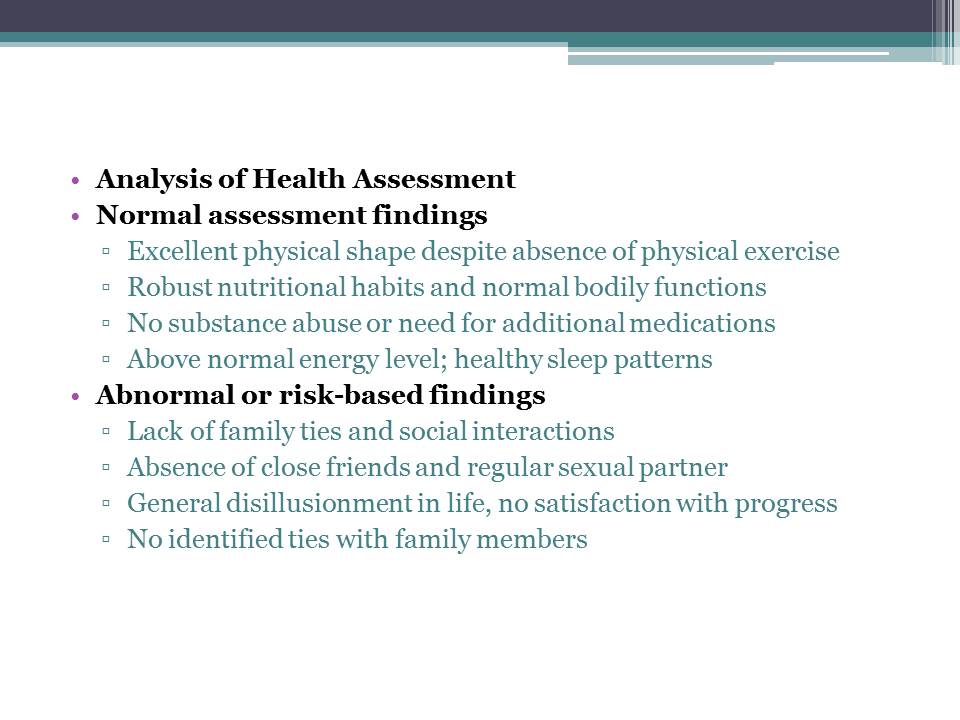
Additional Observations
Cultural
- Does not explicitly displays significant cultural influences.
- Profile generally consistent with social environment.
- Displays little resistance to abusive behavior by peers.
- Does not recognize traditional cultural clues in interaction.
Geographical
- Native to the location of Edge City.
- Profile consistent with characteristics of major American cities.
Religious
- Does not actively engage in religious practices.
- Prone to religious background of other cultures.
- Readily accepts the existence of supernatural forces.
- Not hindered by the apparent danger of the artifact.
Ethnic
- Consistent with ethnic profile of Edge City.
- Open to ethnic background of other cultures.
- Accepts ethnic diversity as a part of life.
- Unlikely to display difficulties in diverse environment.
Spiritual
- Believes in the existence of incorporeal forces.
- Readily engages in interaction with them on regular basis.
- Uses the mask to achieve the desired outcomes.
- Does not display concerns with adverse effects.
Nursing Considerations
Nursing Diagnosis
- Loneliness and potential mood disorders associated with isolation.
- Occasional emotional breakdowns of moderate severity.
- Anxiety resulting from the inability to establish family.
- Lack of proficiency in interaction with peers.
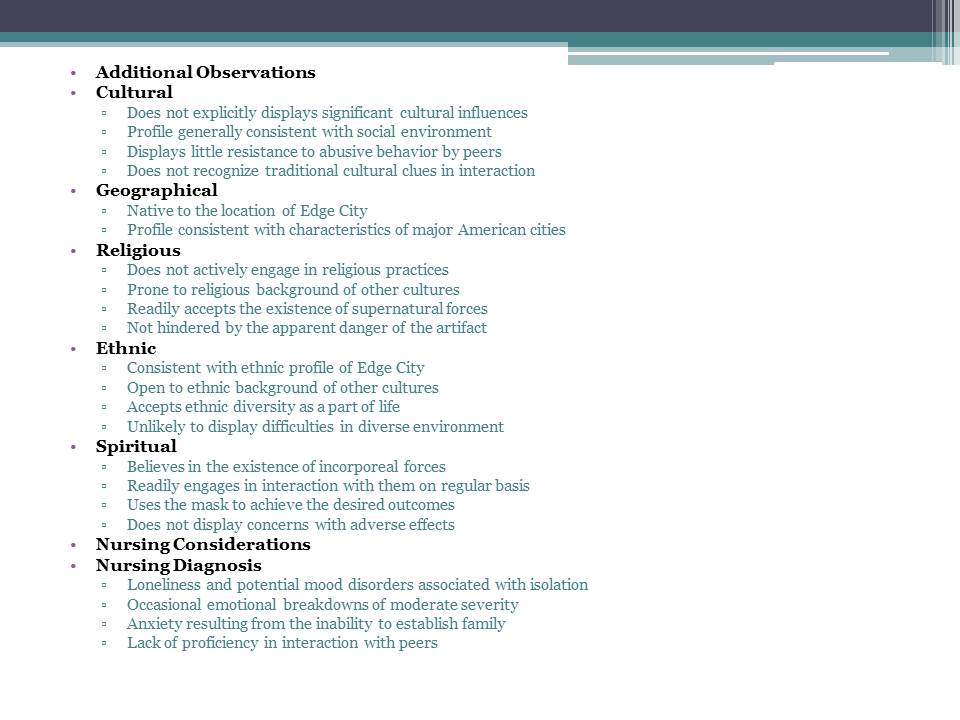
Interventions
One
- Establish meaningful communication channels with patient.
- Foster trust, feeling of security, and safety.
- Allocate time for regular sessions with patient.
- Provide initial counseling, support, and encouragement (Low et al., 2014).
Two
- Seek ways of participation in social groups (Shankar, Hamer, McMunn, & Steptoe, 2013).
- Establish and strengthen ties with peers.
- Promote active social role and establish trust.
- Improve self-esteem and enable reflection practices.
Three
- Promote personal insights and enable individual motivation (Allender, Rector, & Warner, 2013).
- Increase independence and self-management skills.
- Encourage consistency in establishing and reaching goals.
- Provide information on sources of encouragement.
Resources
One
- Training sessions and workshops providing personal improvement.
- Local groups providing support and counseling.
- Seminars promoting independence and individual sustainability.
Two
- Access to literature on self-development and success.
- Manuals providing guidance on scheduling and benchmarking.
- Online resources and interactive planning tools.
Conclusion
- Stanley displays no signs of physical character.
- Challenging emotional background mitigated by personal resilience.
- Suggested interventions aimed at assistance.
- Combined with displayed characteristics, quick recovery expected.
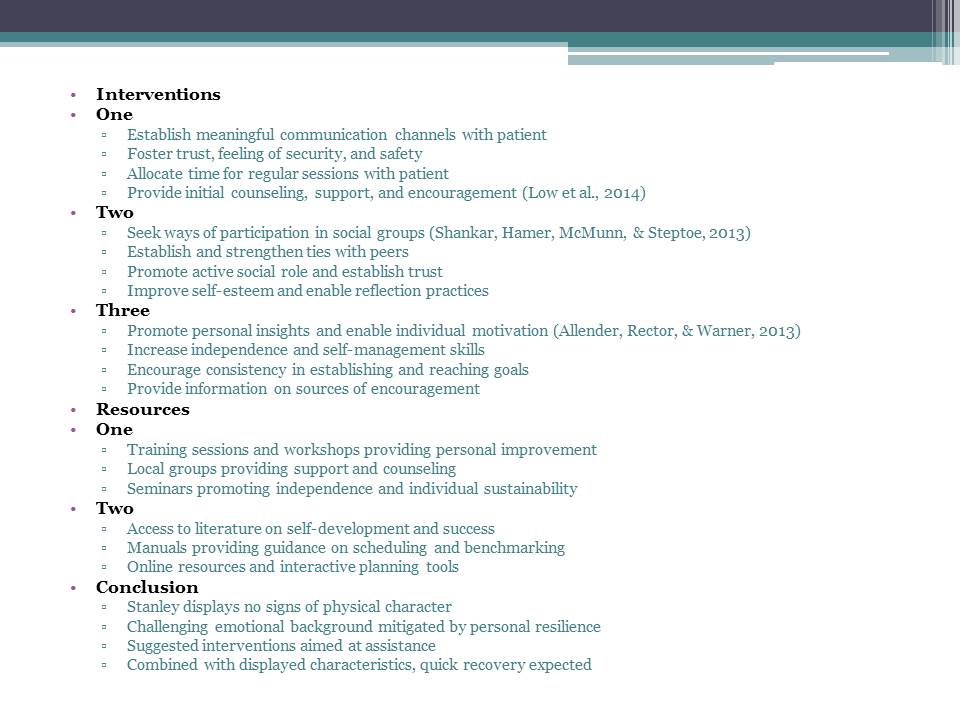
References
Allender, J., Rector, C., & Warner, K. (2013). Community & public health nursing: Promoting the public’s health. Fresno, CA: Lippincott Williams & Wilkins.
Low, L. F., Goodenough, B., Fletcher, J., Xu, K., Casey, A. N., Chenoweth, L., . . . Brodaty, H. (2014). The effects of humor therapy on nursing home residents measured using observational methods: the SMILE cluster randomized trial. Journal of the American Medical Directors Association, 15(8), 564-569.
Shankar, A., Hamer, M., McMunn, A., & Steptoe, A. (2013). Social isolation and loneliness: relationships with cognitive function during 4 years of follow-up in the English Longitudinal Study of Ageing. Psychosomatic Medicine, 75(2), 161-170.